What Is the Blue Economy? - Blue Economy Definition


The term ‘blue economy’ was originated by the Belgian economist Gunter Pauli in his book titled The Blue Economy. This book was published in 2012 and is an outline for a business model which incorporates ocean conservation into economic development. This term defines an economy that makes responsible and sustainable use of the oceans, seas and marine resources. The blue economy is based on these fundamental principles which ensure sustainability in the marketplace.
thedailyECO asks what is the blue economy? We answer by providing a blue economy definition, as well as setting out the main principles of the blue economy and what are its goals.
What is the blue economy?
The blue economy refers to sustainable economic development that focuses on making sustainable use of the oceans, seas, and marine resources. It is an economic concept which does not stop the exploitation of the ocean for capital gain, but it does so while preserving and regenerating the world's oceans.
This economy is based on the idea that both the seas and the oceans have vast economic opportunities that can and should be used sustainably. This not only promotes economic growth, but also protects and conserves the marine environment. The benefits obtained with this economy should benefit both society and the environment. It is as a result of the exploitation of the seas which has resulted in their pollution and environmental degradation.
A basic definition of the blue economy is the economic exploitation of the world's oceans which promotes marine conservation and stability in the process. However, it is important to point out that it is a loose concept which has been used to promote “wide variety of development approaches and priorities in the ocean and coastal areas”[1].
While there are certain principles of the blue economy which help to support the oceans, there is still some doubt over the priorities of institutions. We can say that the world's economy is based on the exploitation of natural resources. An attempt to conserve them and to provide sustainability for our oceans is a positive direction, even if it can also be problematic.
Learn about other types of environmental degradation in our related article.

Principles of the blue economy
We have provided the basic definition of the blue economy, but we want to look at its principles in more detail. While there is disagreement over how the blue economy is interpreted[2], there are some basic, agreed upon principles which can help us to better understand the concept:
- Sustainability: the blue economy focuses on the sustainable use of marine resources, avoiding their depletion and minimizing the negative impacts that occur in various types of aquatic ecosystems. It seeks to promote economic practices that are respectful of the environment and responsible by society.
- Innovation: this economy fosters innovation in technologies, processes and business models to drive economic growth and job creation. It seeks to develop innovative and efficient solutions that take advantage of marine resources in a sustainable manner.
- Cooperation: through the blue economy, cooperation between different sectors, institutions and stakeholders is promoted. The management and development of marine resources require the collaboration of multiple stakeholders. These include governments, companies, local communities, scientists and non-governmental organizations.
- Closed cycle: the blue economy seeks to promote a closed cycle. Within this clue economy cycle, products, by-products and waste are recycled, reused or valued instead of being discarded. This helps to reduce the generation of waste and promote the efficient use of marine resources.
- Resilience: the blue economy is concerned with the resilience of marine ecosystems and coastal communities in the face of environmental and economic challenges. Seeks to promote the conservation and restoration of marine ecosystems.
- Equity: this economy promotes equity in access and distribution of benefits generated by economic activities related to marine resources. It seeks to avoid unequal exploitation of resources and to ensure that local communities and developing countries also benefit fairly from resources.

Importance of the blue economy
The blue economy concept has proved popular among many of the world's institutions. This is because it does not want to stop economic exploitation of the ocean, but it has the potential to gain support from conservationists who can see the benefit it has to the world's seas. This benefit includes:
- Environmental sustainability: this is of great importance, since it helps to conserve and protect marine ecosystems. The oceans play a vital role in climate regulation, oxygen production, carbon sequestration and biodiversity.
- Economic growth: the blue economy offers opportunities for economic growth and job creation through activities such as sustainable aquaculture, coastal and marine tourism, marine renewable energy and marine biotechnology.
- Food security: sustainable aquaculture is an important component of the blue economy and plays a key role in food security. With the world's population increasing, traditional fisheries resources are under pressure. Aquaculture offers a way to produce food sustainably.
- Innovation and technological development: development of new technologies and solutions to take advantage of marine resources in a sustainable manner. These technological advances not only contribute to the blue economy, but may also have applications in other sectors.
- Resilience and adaptation to climate change: the oceans play a very important role in mitigating and adapting to climate change. The blue economy seeks to strengthen the resilience of marine ecosystems and coastal communities against the impacts of climate change, such as sea level rise, ocean acidification and extreme weather events.
The blue economy is one of the various initiatives which have been suggested to protect nature's ecosystems. We look at examples of the blue economy in action to better understand the effects of such initiatives.

Examples of the blue economy
The blue economy concept has been established, but its implementation is not always well understood. The following are some of the key examples of the blue economy in action:
- Sustainable aquaculture: farming of fish, shellfish and algae in a responsible manner, minimizing environmental impacts and promoting food security, as well as promoting an adequate consumption of fish, shellfish and algae based on existing resources. This can also help to avoid problems such as red tide algae blooms since the aquaculture is more controlled.
- Sustainable coastal and marine tourism: promotion with environmental education campaigns of responsible tourism in coastal and marine areas, which help preserve ecosystems and local culture.
- Marine renewable energy: development of technologies to harness the energy generated by wind, currents and ocean waves. In doing so, we can reduce our dependence on fossil fuels, as well as limit the ocean pollution which is derived from an energy sector based on them.
- Marine biotechnology: research and development of products and medicines based on marine organisms, seeking to take advantage of their biological and genetic potential.
- Management and conservation of marine protected areas: establishment and management of marine reserves and protected areas with the aim of preserving biodiversity and marine ecosystems.
- Circular economy in fishing: implementation of practices that reduce waste and promote recycling and reuse in the fishing industry.
Now that you know what the blue economy is and its principles, you can take a look at significant problem faced by the blue economy with our article on the consequences of plastics in the ocean.

If you want to read similar articles to What Is the Blue Economy? - Blue Economy Definition, we recommend you visit our Environmental education category.
1. Voyer, M., Benzaken, D., & Rambourg, C. (2022). Institutionalizing the Blue Economy: an examination of variations and consistencies among Commonwealth countries. Philosophical transactions of the Royal Society of London. Series B, Biological sciences, 377(1854), 20210125.
https://doi.org/10.1098/rstb.2021.0125
2. Schutter, M. S., Hicks, C. C., Phelps, J., & Waterton, C. (2021). The blue economy as a boundary object for hegemony across scales. Marine Policy, 132, 104673.
https://doi.org/10.1016/j.marpol.2021.104673.








